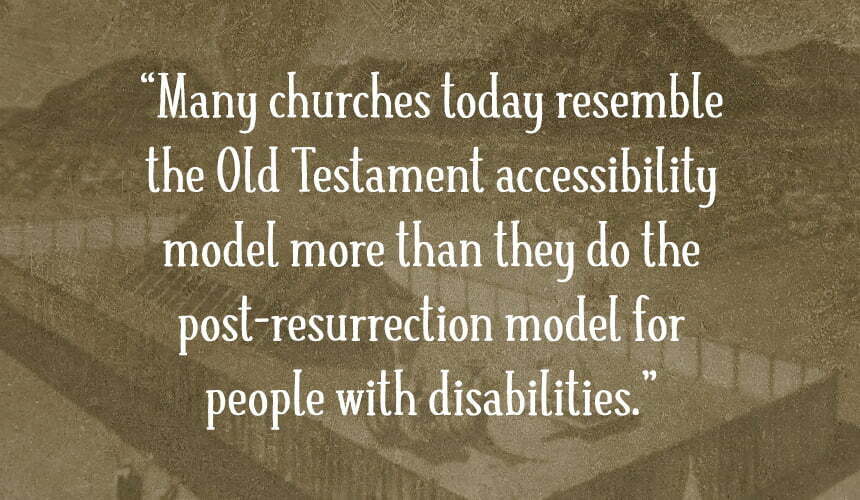

If someone were to ask you, “Was God accessible to people in the Old Testament?” How would you respond? The answer may not be as simple as you think.
The answer is technically, yes. God was accessible in the Old Testament, but His accessibility was extremely limited and only made available through a very strict system of rules.
Sounds like accessibility to some, or most churches today for people with disabilities!
Ouch! I know. Let’s dig in.
The Old Testament designates two chapters to document the creation of the entire universe and all of creation while it spends 50 chapters documenting the tabernacle. This is more chapters designated to one subject than any other in all of the Bible. Why is this significant?
The tabernacle was where the presence of God dwelt on earth in the Old Testament. It richly foreshadows the coming of Jesus and the privilege of being a part of God’s family.
Now let’s talk about just how accessible God was to His people in the tabernacle.
So was God accessible to people? Technically, yes.
If you look at the Bible’s timeline there are about 4,000 years between creation and the birth of Jesus. So for God, just being accessible isn’t enough. There was always a plan to make accessibility to God for ALL people and not limit it to only the high priest on one day a year through the strictest of rules.
Jesus becomes our high priest when God sends Jesus to humanity 2,000 years ago to give access to Himself to ALL people. With the death and resurrection of Jesus, the veil of the temple was torn and accessibility to God was granted to ALL people.
How does this mirror accessibility to God through the local church for the disability community?
You would like to believe that when the temple veil was torn, and God was made accessible to ALL people that was the happy end of the story. Sadly, many churches today resemble the Old Testament accessibility model more than they do the post-resurrection model for people with disabilities.
Is that an outrageous statement? I don’t think so. Consider the ADA (Americans with Disabilities Act) that was signed into law by President George H.W. Bush on July 26, 1990. The ADA is one of America’s most comprehensive pieces of civil rights legislation that prohibits discrimination and guarantees that people with disabilities have the same opportunities as everyone else. Did you know that only one institution was granted an exemption from ADA? Only one institution would not be held liable for not being accessible for people with disabilities. Only one institution would not be held liable for discriminating against people with disabilities. Did you know what institution that is? Religious institutions (churches, synagogues, mosques, etc.).
Sure, most churches built post-1990 have been built to meet ADA accessibility codes, but what about all of the old church buildings? Have they been brought up to code? My guess is, no. Even if all of the church buildings were accessible, I want to declare that just being accessible isn’t enough.
Just as God, the Father, put the stake in the ground and decided that there was no other option than sending Jesus churches must come to realize that just being accessible isn’t enough.
This reality can be seen once again by studying the example of Jesus. Look first to the proclamation of Jesus at the beginning of his public ministry. Jesus fulfills the prophecy of Isaiah by declaring he is the promised Messiah. Not only does Jesus do this but he also reveals who he is planning on targeting in his ministry efforts.
The Spirit of the Lord is upon me,
for he has anointed me to bring Good News to the poor.
He has sent me to proclaim that captives will be released,
that the blind will see,
that the oppressed will be set free,
and that the time of the Lord’s favor has come.
Jesus does not stand up at the pulpit of the Church declaring that he was there for “all people.” Sure, he was. That is understood, but for Jesus simply being accessible wasn’t enough. Jesus declares that he came to specifically minister to the poor, prisoners, disabled, and the oppressed. As you read through the Gospel accounts Jesus follows through on his words. The vast majority of his miracles, teachings, and efforts are targeted at these four people groups because just being accessible isn’t enough.
Now let us consider a scripture when Jesus sits down with the Church leadership one last time a week before he goes to the cross to die. This would no doubt be his final arguments, his final instructions, his final plea, and his drop-the-mic moment with leadership at the end of his ministry.
What is important to note in the scripture is the fact that Jesus narrows down his ministry target list from four people groups down to just two people groups.
“The servant returned and told his master what they had said. His master was furious and said, ‘Go quickly into the streets and alleys of the town and invite the poor, the crippled, the blind, and the lame.’ Luke 14:21
So, who does Jesus tell Church Leadership they need to reach with a real sense of urgency? He specifically said the Church needs to reach the poor and the disabled because just being accessible isn’t enough.
Was Jesus accessible to all? Of course, he was!
But Jesus knew that just being accessible wasn’t enough. He knew that if ALL people had a chance to find inclusion and belonging, he would have to be intentional about his focus in his ministry. He knew that he would have to be specific in his commands to church leadership about who they were to intentionally focus on too.
Jesus did not simply declare that he wanted to focus his ministry on reaching specific people groups, he did something about it! He spent his entire ministry focusing on specific people groups. He ended his ministry by commanding church leadership to focus on specific people groups.
Words are cheap! The disability community can see through the cheap words from churches. Words are never enough.
Without intentionality and action inclusion and belonging in God’s family for ALL people is not possible. Be intentional. Move beyond words to action. Follow the example and the commands of Jesus.
If you believe that just being accessible isn’t enough and you aren’t sure where to start, we would love to help you.
You can move from disability accessibility to inclusion, and ultimately create a place of belonging for your disability community by following the example of Jesus and we can help. If you want to be more than just accessible, let’s setup time to talk and get started.


